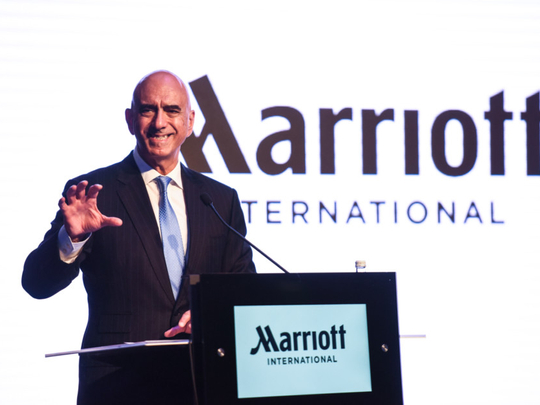
DUBAI: Following Marriott International’s acquisition of Starwood Hotels and Resorts Worldwide, the consolidated entity, called Marriott International, looks to add 50,000 more rooms to its Middle East and Africa (MEA) portfolio by 2022, according to a top company executive.
Marriott completed its $13 billion (Dh47.7 billion) acquisition of Starwood on Friday, creating the world’s largest hotel company, with 5,700 hotels and 1.1 million rooms, representing 30 brands in over 110 countries. The deal combines Marriott’s Courtyard by Marriott and The Ritz-Carlton with Starwood’s St Regis, W and Four Points by Sheraton, in a single portfolio.
“Today, we have 90,000 [rooms in the MEA] that are operating and under construction. By 2022, the 90,000 will be 140,000. That is my ambition,” Alex Kyriakidis, President and Managing Director for the Middle East and Africa at Marriott International, told Gulf News on the sidelines of a press conference in Dubai on Sunday.
The combined company has 52,000 rooms in operation and 37,000 under construction in the MEA.
The UAE is Marriott International’s biggest market in the region, with 42 hotels and 13,680 rooms in operation and 38 hotels and 9616 rooms in the pipeline. By 2025, the company looks to grow that to 80 hotels and 23,296 rooms, according to Kyriakidis. Saudi Arabia is its second largest market, where it expects to have 53 hotels operating and in the pipeline by 2020, followed by South Africa, Egypt and Qatar, he said. “Between these five markets, they will account for 70 per cent of our rooms in the MEA. We have now become the dominant player in the region…at 90,000 [rooms], we are 33 per cent higher than Accor, which is number two.”
Budget segment
Kyriakidis said he sees the most growth in the region over the coming years in the budget hotel segment.
“I think over the next five years, we are still going to see growth in all three segments: luxury, premium and select [budget]. But I think we will see the greatest growth proportionately in the select segment… because in quite a few cities, particularly in the Gulf, the luxury space is maxed out. But there is demand for value priced brands for guests whose budgets are not at the luxury or premium end.”
He also said that in some markets in the Gulf, such as Saudi Arabia, there is demand for hotels in secondary cities, where he sees opportunity for growth. “If you take a market like the kingdom, traditionally the focus has been in Riyadh, Jeddah, Makkah and Madinah. With a 30 million population, there is a significant pent up demand from Saudis to travel and visit family and friends in other parts of the country, [such as] Ha’il and Jazan. That’s where we see great opportunity to put select brands, such as Courtyard by Marriott and Four Points by Sheraton.”
He, however, declined to give revenue forecasts.
No job cuts
Unlike other consolidations in the industry which often lead to redundancies, Marriott’s acquisition of Starwood will not lead to job cuts, Kyriakidis said. “As of last Friday, we are one company of 40,000 associates in 30 countries. There will not be deliberate job loss,” he said, adding that the new company will need “another 30,000 employees” in the MEA region over the next three years, with 5,000-6,000 of those needed in the UAE.
Starwood went out in the market looking for a buyer in April last year. It had struggled to get ahead of its competition, especially in the limited service hotels segment.
The one-time transaction cost for the merger is expected to be around $140 million, Marriott International said in a statement. It added that the new combined company will keep Marriott’s Bethesda, Maryland headquarters, and that Arne Sorenson remains the president and chief executive of Marriott International.
BOX: More benefits for loyalty programme members
DUBAI: Guests that have signed up for Marriott International and Starwood Hotels and Resorts Worldwide guest loyalty programmes are expected to reap more benefits, following the merger of the two hotel companies. Members of Marriott’s and Starwood’s loyalty programmes can now link their accounts, according to the new hospitality giant Marriott International.
On Friday, Marriott started to “match member status across Marriott Rewards — which includes The Ritz-Carlton Rewards and Starwood Preferred Guest (SPG) — enabling members to transfer points between the programs for travel and exclusive experiences when they link their accounts,” Marriott said in a statement.
It added that the programmes will offer members “more benefits when they link their accounts, as well as new destinations such as Aruba, Tuscany’s Serchio Valley and Kruger National Park in South Africa for SPG members and the Maldives, Bora Bora and Santorini, Greece for Marriott Rewards, and The Ritz-Carlton Rewards members.”
-S.A.












